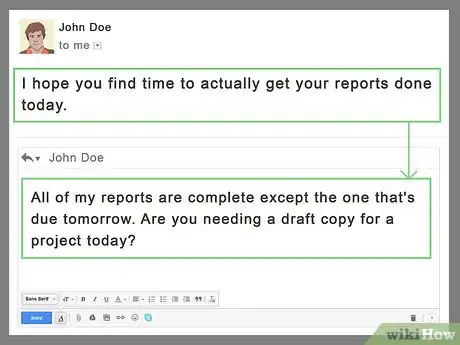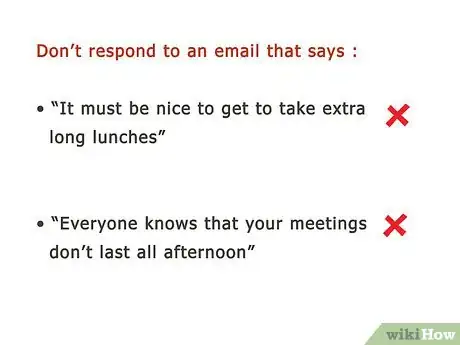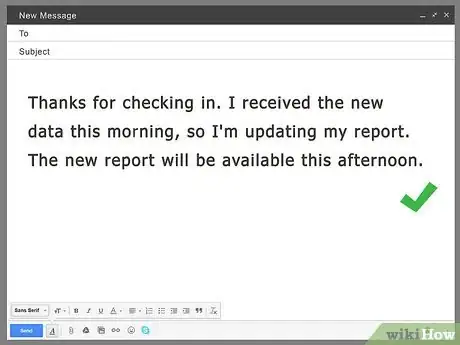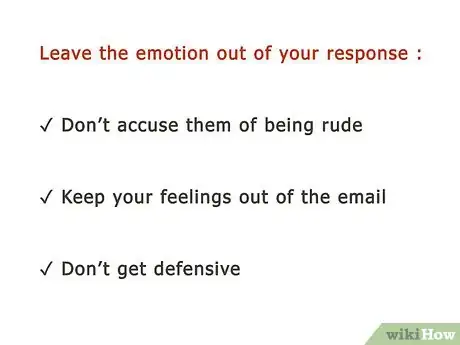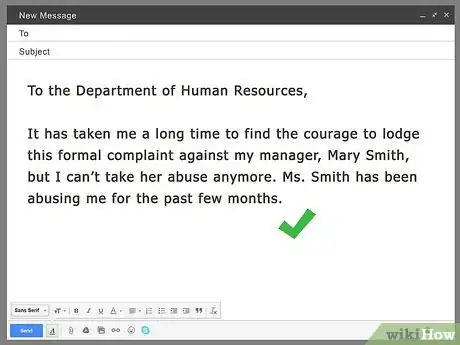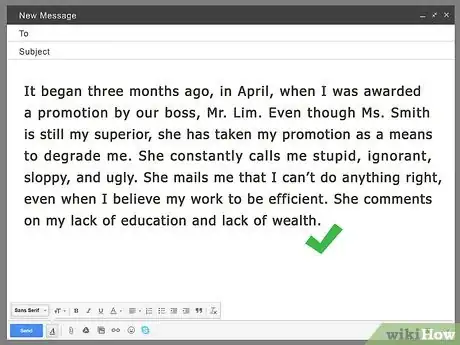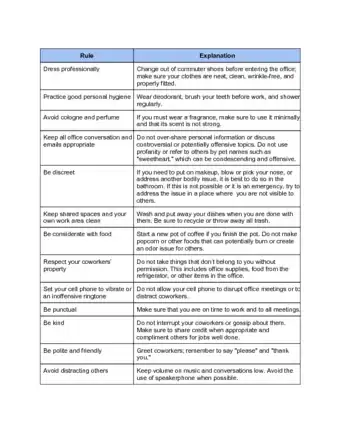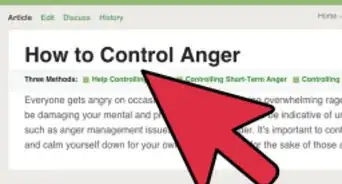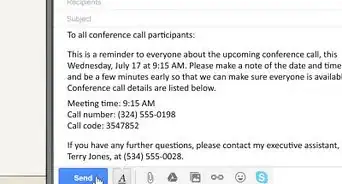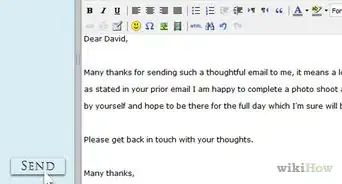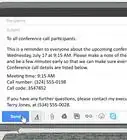This article was co-authored by William Gardner, PsyD and by wikiHow staff writer, Danielle Blinka, MA, MPA. William Gardner, Psy.D. is a Clinical Psychologist in private practice located in San Francisco, CA’s financial district. With over 10 years of clinical experience, Dr. Gardner provides individually tailored psychotherapy for adults using cognitive behavioral techniques, to reduce symptoms and improve overall functioning. Dr. Gardner earned his PsyD from Stanford University in 2009, specializing in evidence-based practices. He then completed a post-doc fellowship at Kaiser Permanente.
This article has been viewed 455,003 times.
Receiving a rude email at work can be a difficult situation to navigate. While it’s tempting to fire off a response when you feel like someone’s being rude to you, keeping a professional attitude is important. Before you respond - either via email or in person - take a moment to breathe, then clarify the intent of the message and formulate what you want to say in response.
Steps
Clarifying the Sender's Intent
-
1Decide if it’s worth your time and energy. It’s tempting to fire off a reply, but calm down with a few deep breaths. Then ask yourself if the email really deserves your attention. While you may feel offended, don’t let this person dictate how you feel or the tone of your day.[1]
- Focus on what’s right for you.
- Ask yourself, “What am I accomplishing here? What will happen if I confront this person? What will happen if I don’t?”
-
2Avoid making assumptions. We all communicate in different ways, and writing isn’t a strong skill for everyone. What one person believes is a professional, direct statement can come off as brash or rude to someone else. Don’t assume right away that they meant to be rude.[2] [3]
- Language or regional differences can cause miscommunications.
- When people try to use sarcasm or humor in an email, it is often misconstrued as rudeness.[4]
Advertisement -
3Ask the sender for more information. Respond asking for more information, citing specific statements that you’d like clarified. Sometimes rude messages are just poorly worded.[5] For example, your coworker may have sent you a message saying, “I hope you find time to actually get your reports done today."
- You could respond, “All of my reports are complete except the one that's due tomorrow. Are you needing a draft copy for a project today?”
- Don’t demand to know what they mean or be curt. For example, don’t ask, “What’s that supposed to mean?” or “What are you trying to say?”
-
4Talk to the sender. Talking to the person will allow you to better hear the tone of their words. Visit their workspace or call them to discuss your shared work or topics related to the email. Ask them to explain the rude statements from the email.
- Say, “I had a follow-up thought about the project and thought it’d be easier to say it in person. Do you have a minute?”
- You could also say, “Your email suggested that the specs were supposed to be ready already, but the due date they sent me said they weren’t due until next week. Am I working off of the wrong timeline?”
Writing a Response
-
1Avoid responding if no response is required. If the email does not require a response, not sending one could be the best option. Consider not responding if you receive emails that are off topic and don’t require your attention.
- For example, coworkers may sometimes make assumptions about your work habits. Don’t respond to an email that says, “It must be nice to get to take extra long lunches,” or “Everyone knows that your meetings don’t last all afternoon.” As long as your manager knows the truth, you're better off staying out of office drama.
-
2Stay professional. If a response is needed, the tone should be professional, even if the sender was not professional. Read your email out loud before sending it to make sure that it sounds professional rather than rude or emotional.
- Avoid being blunt in your response, as that can sound rude.[6]
-
3Take your time writing your response. Your response needs to be calm and professional, so don’t write it in a rush. Most emails are not time-sensitive, so you can take all day to respond if you need to.[7]
- After you write your response, set it aside for about an hour.
- If you know that you’re writing out of emotion, switch to a different task until you calm back down.
- Add the email address last to avoid accidentally sending it early.[8]
-
4Keep your message short and simple. Don’t try to respond to everything, and don’t provide a long personal defense. If you want to squash the rude behavior, you need to keep your email focused on work topics.[9]
- Choose one work-related topic to focus on.
-
5Stick to the facts and don't elaborate. One way to ensure that your email is professional is to only discuss facts. Facts include specific things like what work has been assigned and completed, due dates, timelines, data, and related topics.[10]
- For example, if the rude email asked about the status of a report, say, "Thanks for checking in. I received the new data this morning, so I'm updating my report. The new report will be available this afternoon."
- This keeps the focus of the response on the work you were assigned and the progress of your project, not on your reaction to your rude coworker.
-
6Leave the emotion out of your response. It’s tempting to get defensive or rude in response to an offensive email, but it will only worsen the situation. Instead, take the professional high road.[11]
- Don’t accuse them of being rude.
- Keep your feelings out of the email.
- Before you hit send, ask yourself if any part of the email is a defense of yourself.
Getting Additional Support
-
1Report harmful speech or a personal attack. If the email contains threats or a personal attack, then you should make a copy of it and discuss it with your manager and HR. Make sure that the incident is documented by your workplace, and ask that an investigation be done.[12]
- Tell them if you feel that the contents of the email create a hostile work environment.
-
2Speak up if the rudeness becomes harassment. Make a record of each time an incident occurs to help show a pattern of behavior. If you are receiving frequent rude emails that are affecting your work environment, then take your records to your manager or HR department.[13] Bring copies of the emails with you to show them what you mean.[14]
- When deciding who to report the issue to, think about the politics of your office. As an example, if your manager is really close to the offending person, it might be best to go to HR.
-
3Talk to HR if your manager sends a rude email. HR or your manager’s supervisor can help if your manager is the sender of a rude email. Before you report the incident, be prepared to explain why you thought the email was rude. Depending on what was said, you may be asked to fill out an incident report, be asked to attend a mediation meeting, or be reassigned to a new department.
- Reporting the rude email(s) to HR will be the only way that anything can be done about your manager’s behavior toward you if it continues. You need to establish a record on file.
Office Etiquette
Expert Q&A
-
QuestionHow can I make my coworker stop being annoying without talking to them about it?
 William Gardner, PsyDWilliam Gardner, Psy.D. is a Clinical Psychologist in private practice located in San Francisco, CA’s financial district. With over 10 years of clinical experience, Dr. Gardner provides individually tailored psychotherapy for adults using cognitive behavioral techniques, to reduce symptoms and improve overall functioning. Dr. Gardner earned his PsyD from Stanford University in 2009, specializing in evidence-based practices. He then completed a post-doc fellowship at Kaiser Permanente.
William Gardner, PsyDWilliam Gardner, Psy.D. is a Clinical Psychologist in private practice located in San Francisco, CA’s financial district. With over 10 years of clinical experience, Dr. Gardner provides individually tailored psychotherapy for adults using cognitive behavioral techniques, to reduce symptoms and improve overall functioning. Dr. Gardner earned his PsyD from Stanford University in 2009, specializing in evidence-based practices. He then completed a post-doc fellowship at Kaiser Permanente.
Clinical Psychologist Just talk to them. That's really got to be the first step unless they're acting truly egregiously. Working through the issue with the person directly is always preferable to any other solution that involves other people getting involved.
Just talk to them. That's really got to be the first step unless they're acting truly egregiously. Working through the issue with the person directly is always preferable to any other solution that involves other people getting involved. -
QuestionWhy would my coworker start being rude out of nowhere?
 William Gardner, PsyDWilliam Gardner, Psy.D. is a Clinical Psychologist in private practice located in San Francisco, CA’s financial district. With over 10 years of clinical experience, Dr. Gardner provides individually tailored psychotherapy for adults using cognitive behavioral techniques, to reduce symptoms and improve overall functioning. Dr. Gardner earned his PsyD from Stanford University in 2009, specializing in evidence-based practices. He then completed a post-doc fellowship at Kaiser Permanente.
William Gardner, PsyDWilliam Gardner, Psy.D. is a Clinical Psychologist in private practice located in San Francisco, CA’s financial district. With over 10 years of clinical experience, Dr. Gardner provides individually tailored psychotherapy for adults using cognitive behavioral techniques, to reduce symptoms and improve overall functioning. Dr. Gardner earned his PsyD from Stanford University in 2009, specializing in evidence-based practices. He then completed a post-doc fellowship at Kaiser Permanente.
Clinical Psychologist It's possible that you're simply misinterpreting what's going on. I don't think very many people wake up every day and go, "I'm going to be rude today." Take a step back and consider the possibility that you're not acting on complete information or you're not aware what's going on there. They could also just have something going on in their personal life that's influencing their behavior.
It's possible that you're simply misinterpreting what's going on. I don't think very many people wake up every day and go, "I'm going to be rude today." Take a step back and consider the possibility that you're not acting on complete information or you're not aware what's going on there. They could also just have something going on in their personal life that's influencing their behavior. -
QuestionIf a co-worker/office manager is constantly reading e-mails out loud in sarcastic tones to co-workers not on the email or involved in any way with the correspondence, is this a violation of privacy?
 RevadCommunity AnswerIt certainly could be. At the very least it's unprofessional. Review your employee handbook to see what the privacy policy is. Then report this behavior to the HR department or the manager's boss if necessary.
RevadCommunity AnswerIt certainly could be. At the very least it's unprofessional. Review your employee handbook to see what the privacy policy is. Then report this behavior to the HR department or the manager's boss if necessary.
Warnings
- Some people are ticking time bombs and can vent more anger on you if you respond rudely. Stay polite and professional and if you have any concerns or you're afraid, speak to your boss or human resources about it.⧼thumbs_response⧽
- Anything libelous, offensive, harassing, defamatory, racist, or offensive in an email is actionable. Email is discoverable in most jurisdictions and can expose your company to litigation. A person sending such emails can be subject to discipline and even dismissal. If you're concerned that the email contains any such objectionable content, talk to your boss or human resources for further advice, or your legal representative if you don't wish to discuss it with the workplace.⧼thumbs_response⧽
References
- ↑ https://www.psychologytoday.com/blog/the-athletes-way/201512/5-polite-ways-disarm-rude-people
- ↑ https://www.psychologytoday.com/blog/fulfillment-any-age/201309/are-your-emails-unintentionally-rude
- ↑ William Gardner, PsyD. Clinical Psychologist. Expert Interview. 26 March 2021.
- ↑ http://www.businessinsider.com/email-etiquette-rules-every-professional-should-know-2015-6/#-keep-tabs-on-your-tone-13
- ↑ William Gardner, PsyD. Clinical Psychologist. Expert Interview. 26 March 2021.
- ↑ http://www.businessinsider.com/email-etiquette-rules-every-professional-should-know-2015-6/#-keep-tabs-on-your-tone-13
- ↑ https://www.psychologytoday.com/blog/fulfillment-any-age/201309/are-your-emails-unintentionally-rude
- ↑ http://www.businessinsider.com/email-etiquette-rules-every-professional-should-know-2015-6/#-keep-tabs-on-your-tone-13
- ↑ https://www.businessknowhow.com/growth/emailblunders.htm
- ↑ https://www.businessknowhow.com/growth/emailblunders.htm
- ↑ https://www.fastcompany.com/3057096/the-perfect-email-is-short-simple-and-not-too-emotional
- ↑ William Gardner, PsyD. Clinical Psychologist. Expert Interview. 26 March 2021.
- ↑ William Gardner, PsyD. Clinical Psychologist. Expert Interview. 26 March 2021.
- ↑ https://www.psychologytoday.com/blog/the-athletes-way/201512/5-polite-ways-disarm-rude-people
About This Article
If you receive a rude email at work, it’s best to avoid responding if it’s unnecessary. For example, if a coworker sends you an email that says “I hope you find time to actually get your reports done today,” stay out of the office drama by ignoring it. If a response is needed, keep the tone professional and calm, and stick to the facts to keep emotion out of it. For instance, respond to an email about your work by stating “Thanks for checking in. I got the new data this morning, so I’m updating my report now. It will be ready this afternoon.” By staying calm, you'll look more professional and likely avoid any office drama. To learn how to report harmful speech or a personal attack to your manager, keep reading!



